
Functional Foods in Health and Disease
Scope & Guideline
Exploring the Intersection of Nutrition and Health
Introduction
Aims and Scopes
- Investigation of Bioactive Compounds:
The journal emphasizes the study of bioactive compounds found in various foods, including their extraction, characterization, and potential health benefits. - Clinical Trials and Health Outcomes:
A core focus is on randomized controlled trials assessing the efficacy of functional foods and dietary supplements on health markers, disease prevention, and overall well-being. - Food Science and Technology Innovations:
The journal highlights advancements in food processing technologies that enhance the functional properties of foods, including fermentation, extraction techniques, and food formulation. - Nutritional Interventions and Dietary Patterns:
Research on the impact of specific diets, such as the Mediterranean diet, on health outcomes, showcasing how dietary patterns can influence chronic disease management. - Functional Foods and Gut Health:
A significant area of interest is the role of functional foods in modulating gut microbiota and their implications for digestive health and systemic inflammation.
Trending and Emerging
- Gut Microbiome Interventions:
There is an increasing emphasis on studies that explore how functional foods can positively influence the gut microbiome, highlighting their role in digestive health and metabolic diseases. - Personalized Nutrition:
Research is trending towards personalized approaches in nutrition, investigating how individual variations in genetics, metabolism, and microbiome can tailor dietary recommendations for better health outcomes. - Plant-Based Functional Foods:
The rise of plant-based diets has led to a surge in research focusing on plant-derived functional foods, including their anti-inflammatory and antioxidant properties. - Food as Medicine:
A growing interest in the concept of 'food as medicine' is reflected in studies that examine the therapeutic effects of specific food components on chronic diseases, particularly in managing conditions like diabetes and cardiovascular diseases. - Functional Foods in Chronic Disease Management:
There is a noticeable increase in research that connects functional foods with the management and prevention of chronic diseases, particularly in relation to obesity, diabetes, and heart health.
Declining or Waning
- Traditional Medicinal Plants:
Research on traditional medicinal plants appears to be declining, with fewer studies published on their health benefits compared to the rising interest in modern functional foods and nutraceuticals. - Animal Studies:
There seems to be a reduction in studies involving animal models, as researchers increasingly focus on human clinical trials and in vitro studies to provide more direct evidence of health benefits. - Nutritional Supplementation without Food Context:
Research focusing solely on the effects of isolated supplements, without considering the food matrix, is diminishing as the journal emphasizes the importance of whole foods and dietary patterns.
Similar Journals
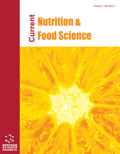
Current Nutrition & Food Science
Transforming insights into impactful nutritional solutions.Current Nutrition & Food Science is a prominent journal in the fields of Food Science, Nutrition, and Dietetics, published by Bentham Science Publishers Ltd. Based in the United Arab Emirates, the journal has been a significant resource since its inception in 2006, and is expected to continue contributing valuable insights through 2024. With an impressive impact factor and a comprehensive scope that examines the intersection of nutrition, food science, and public health, it operates within Category Quartiles reflecting its standing, with rankings in Q3 for Food Science and Nutrition, and Q4 for Public Health. Despite its challenges in visibility as indicated by current Scopus rankings, the journal remains a critical platform for ongoing research and discussions in the realm of nutritional science. Researchers, professionals, and students alike will find that the journal's commitment to quality and relevance makes it an essential tool for advancing understanding and innovation in nutrition and food science.

Acta Scientiarum Polonorum-Technologia Alimentaria
Unveiling Cutting-Edge Discoveries in Food ScienceActa Scientiarum Polonorum-Technologia Alimentaria, published by Poznan University of Life Sciences, is a revered journal in the field of food science, showcasing cutting-edge research and innovations in food technology. Established as a leading platform within its domain, this journal is indexed under Scopus and ranks in the 2023 Q3 quartile for Food Science, demonstrating its commitment to high-quality scholarship. With an ISSN of 1644-0730 and E-ISSN 1898-9594, it serves as a critical resource for researchers, professionals, and students seeking to stay at the forefront of advancements in food safety, quality control, and sustainable practices. The journal has also been recognized for its contributions to the agricultural and biological sciences, positioning itself at rank #205 out of 389 in this competitive field. While currently not offering open access, the journal's valuable insights and findings, especially as it publishes through 2024, play a crucial role in advancing knowledge and fostering collaboration among experts in the food science sector.

Frontiers in Nutrition
Advancing nutritional science for a healthier tomorrow.Frontiers in Nutrition, published by FRONTIERS MEDIA SA, is a leading open access journal dedicated to advancing the field of nutrition through rigorous research and innovative insights. Since its inception in 2014, it has established itself as a key resource for researchers, healthcare professionals, and policymakers interested in the multidimensional aspects of nutrition and its impact on health and disease. The journal boasts a commendable reputation with a quartile ranking of Q1 in Food Science and multiple Q2 rankings in Endocrinology, Diabetes and Metabolism, as well as Nutrition and Dietetics, reflecting its high-quality contributions to the scientific community. With an accessible platform that ensures the wide dissemination of knowledge, Frontiers in Nutrition is committed to fostering collaboration among experts and promoting findings that can lead to healthier populations worldwide. The journal encourages submissions that address the complex interplay between nutrition and health, thus bridging the gap between research and practical application. Join us in exploring how nutrition can enhance well-being and address global health challenges.
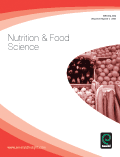
Nutrition & Food Science
Innovating food science for better health outcomes.Nutrition & Food Science, published by EMERALD GROUP PUBLISHING LTD, is a prominent journal dedicated to advancing the understanding of nutritional science and food technology. With an ISSN of 0034-6659 and an E-ISSN of 1758-6917, this journal has provided a platform for scholarly articles, reviews, and insightful research since its inception in 1971. The journal is recognized in the Q3 quartile for both Food Science and Nutrition and Dietetics categories, showcasing its moderate impact within the field. Currently ranked #202 in Food Science and #81 in Nutrition and Dietetics based on Scopus metrics, it caters to a diverse audience of researchers, practitioners, and students eager to explore the latest findings and developments. While not an open-access journal, it offers various subscription options for individuals and institutions keen on accessing high-quality research. With a commitment to interdisciplinary collaboration and practical applications, Nutrition & Food Science is an essential resource for those invested in improving health outcomes through informed dietary practices and food innovations.
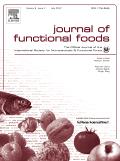
Journal of Functional Foods
Advancing the Science of Health Through FoodJournal of Functional Foods, published by Elsevier, is a leading open-access journal that has been at the forefront of research in the fields of Food Science, Medicine, and Nutrition and Dietetics since its establishment in 2009. With an impressive impact factor and consistently high rankings in Scopus, being placed in the Q1 category for both Food Science and Medicine (miscellaneous), and Q2 for Nutrition and Dietetics, this journal provides a crucial platform for the dissemination of innovative studies and findings related to the health benefits of functional foods. Recognized for its rigorous peer-review process and commitment to open-access publication since 2020, the journal ensures that critical research is freely accessible to a global audience, facilitating knowledge transfer and collaboration among researchers, professionals, and students. With converged years extending through 2024, the journal continues to play a vital role in advancing the understanding of how food can influence health and nutrition, making it an indispensable resource for anyone working in these rapidly evolving fields.
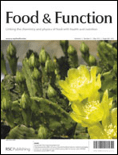
Food & Function
Exploring the Nexus of Food and HealthFood & Function, published by the Royal Society of Chemistry, is a premier journal dedicated to advancing the understanding of food science and its intersection with health and nutrition. With an impressive impact factor and classified in the Q1 quartiles for both Food Science and Medicine (Miscellaneous) as of 2023, this journal stands at the forefront of research dissemination in its field. Established in 2010 and continuously evolving through to 2024, Food & Function presents a broad spectrum of innovative and impactful articles that explore the physiological effects of food components, nutritional science, and the functional properties of food. With a Scopus ranking in the 91st percentile for Agricultural and Biological Sciences, it serves as an invaluable resource for researchers, professionals, and students alike, seeking to explore the intricate relationship between diet and well-being.

Food Production Processing and Nutrition
Elevating understanding of food's role in health and wellbeing.Food Production Processing and Nutrition, published by SpringerNature, stands at the forefront of advancing knowledge in the vibrant fields of food science, nutrition, and public health. This esteemed Open Access journal, operational since 2019, plays a pivotal role in disseminating breakthrough research that intersects food production processes with nutritional insights, making it an invaluable resource for researchers, professionals, and students alike. With a commendable 2023 impact factor reflecting its robust scholarly contributions — Q1 in Food Science and Q2 in both Nutrition and Dietetics and Public Health, Environmental and Occupational Health — the journal not only emphasizes the importance of innovative food processing methods but also addresses pressing nutritional challenges faced globally. Located in the United Kingdom, it claims an impressive Scopus ranking, with a notable percentile standing across various categorical metrics. As such, Food Production Processing and Nutrition is essential for anyone aiming to deepen their understanding of how food systems impact public health through effective processing and nutritional strategies.
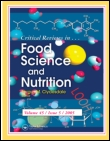
CRITICAL REVIEWS IN FOOD SCIENCE AND NUTRITION
Enhancing Understanding of Nutritional ScienceCRITICAL REVIEWS IN FOOD SCIENCE AND NUTRITION, published by Taylor & Francis Inc, is a premier peer-reviewed journal dedicated to advancing the understanding of food science and nutrition. With its ISSN 1040-8398 and E-ISSN 1549-7852, this influential journal has established itself as an essential resource in the field, featuring high-quality reviews and critical analyses that foster innovation and knowledge sharing among researchers, practitioners, and academics. Recognized as a Q1 journal in Food Science, Industrial and Manufacturing Engineering, and Medicine (miscellaneous) for 2023, it ranks impressively within the top percentiles of its respective fields, making it a valuable platform for impactful research. Although the journal does not currently offer open access, it continues to attract a readership eager to explore the intricacies of food science and its applications, thereby shaping future advancements in the industry. With an extensive history dating back to 1981 and convergence up to 2024, CRITICAL REVIEWS IN FOOD SCIENCE AND NUTRITION remains committed to providing comprehensive reviews that illuminate contemporary challenges and solutions in the domain of food science and nutrition.
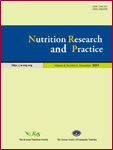
Nutrition Research and Practice
Elevating research to transform dietary practices.Nutrition Research and Practice is a prominent journal dedicated to advancing the field of nutrition and dietetics, published by the esteemed Korean Nutrition Society. With a focus on high-quality research and practical applications, this journal serves as a vital platform for scholars and professionals to disseminate new findings in the interdisciplinary realms of food science and nutrition. The journal boasts an impressive 2023 impact factor, categorizing it in the Q2 quartile in Food Science and Q3 in Nutrition and Dietetics, illustrating its significant reach and impact among peers. Despite being a non-open access publication, it continues to draw attention with its rigorous peer-review process, ensuring that only the most relevant and innovative contributions are shared. With coverage from 2010 to 2024, the journal not only supports a wealth of research but also aims to influence dietary practices and policies in South Korea and globally. Located in the heart of Seoul, Nutrition Research and Practice is an essential resource for researchers, practitioners, and students seeking to deepen their understanding of nutrition and improve public health outcomes.

Journal of the American Nutrition Association
Unlocking the Secrets of Diet and HealthJournal of the American Nutrition Association is a premier scholarly outlet dedicated to advancing the field of nutrition science. Published by ROUTLEDGE JOURNALS, TAYLOR & FRANCIS LTD, this journal aims to disseminate high-quality research that addresses the complexities of diet, health, and nutrition in various populations. With a robust impact factor demonstrating its significance in the realm of Medicine and Nutrition, it holds notable ranks in both the Medicine (miscellaneous) and Nutrition and Dietetics categories within Scopus. The journal supports a vision of expanding access to vital nutrition research through its open-access options, enhancing the visibility and impact of published works. As it continues to evolve from 2022 to 2024, the Journal of the American Nutrition Association stands as an invaluable resource for researchers, health professionals, and students keen on contributing to and staying informed about the latest advancements in nutrition science.